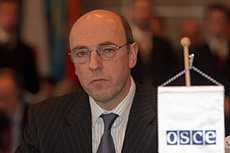FULL TRANSCRIPT OF INTERVIEW 00.00 For many years I was told that the developments in Kosovo and Montenegro was the subject for internationals to talk about it. That in Bosnia itself it was not really a subject. What I understand is that on the occasion of the parliamentary elections in BiH and the particular political rhetoric in Republika Srpska on the referendum on independence that this has brought a ball get rolling again and that the solutions that will come for Kosovo and that has come on Montenegro may have an impact on BiH. So I think the international community is very much committed to the Dayton Agreement and to making BiH viable state which implies that Republika Srpska remains in BiH. A terms to change it will face enormous resistance from the international community and what we want to avoid is a new cycle of separation and division with people having to leave and families being divided or maybe occasional violence and ethnic cleansing happening, this is something that the inert. Community wants to turn back and does not want to see again. 01.37 What we see is coordinated effort of the international community to handle the situation. We are concerned that the solution that will come for Kosovo can not be a solution approved by the politicians in Belgrade. On the other hand, we think that the effort which has been undertaken now is of such a solid and coordinated nature that eventually will make its way in Serbia that there is no other solution possible for the situation create by the Milosevic regime. Therefore the consequences have to be drawn by the Serbian population. We note as a matter a fact that opinion polls reveal that half of the Serbian population understand that Kosovo is lost for Serbia. Ant therefore sometimes the citizens have the wisdom that politicians don’t always have. And have already anticipated that eventual solution for Kosovo might not be the one the Serbian government could be happy with. But nevertheless the one they will have to adjust to. So we are preparing by engaging strongly with Serbian politicians to avoid any misstep. We also are preparing in Kosovo to avoid a kind of backlash on the Serbiapopulation. We certainly don’t want anything to happen to them. And we are working hard to make the solution emerging in Kosovo to be the one which Serb in Kosovo can live with. I think that it is for all sides necessary to step away from dogmatism, from ideology and just to come to the new reality that has been created after the war in 1999 and that everybody would now adjust because the point is that the people in this region have to be able to look to the future. They have to get on now. You can not carry eternally the legacy of the past; you have to move on, at some point you have to decide to have a future, education, appointment, to work and to develop, to be able to establish and to engage in activities and need for that to push all this issue on Kosovo behind. I hope that Serbs can do this, they can now resolutely turn to the future of their republic, EU, achieve the conditions for it, in particular cooperation with the ICTY and move on, because you can not keep people hostage for any longer. 05.05 What M Ahtisaari tells us is that Kosovo leaders have shown certain doses of realism. They have understood that the standards of the UN. This has not been a linear effort but they have eventually come to understand this standard ant they are making an effort to implement them. And secondly they have been putting proposals that would address the special needs of the Serb population ion Kosovo in a way that meet the essential concerns. These are real effort we think on the part of the Albanian leaders to make a step towards a solution. They have been emphasising that they want independence and nothing less. Well, after everything that has happened we also must have some understanding for their position. What M Ahtisaari point is that both sides should make an effort at finding a realistic solution and in that case we can look forward to some kind of coexistence that both parties can live with? So, it is not easy for the Kosovo Albanian leadership either. They will probably have to meet very strong conditions. It will not be a once sided solution that M. Ahtisaari is going to propose. But it would certainly be a solution that requires for both sides a genuine effort at looking at the future and putting the legacy of the past behind them. 06.46 I think we should be prepared d for everything. It would not be right when the issue of Kosovo is still not resolved to say that we can rest on our laurels and turn back. No. I think continued engagement will be necessary. EU has developed a quite an extensive policy. The accession and the Stabilization and Association process is very important to encourage those countries to reform and to move towards fully responsible democratic institutions so we have to remain heavily engaged. As regards Kosovo KFOR is maintaining its full level of presence in the province so we do not think that we have easy months coming. On the contrary we are prepared for acting and certainly not let thing slip away as in the 90ies. So you see a very different attitude of the international community, we are conscious of the difficulties still ahead and we are organising ourselves to organise should instability emerge again. |  Facebook
Facebook Twitter
Twitter




